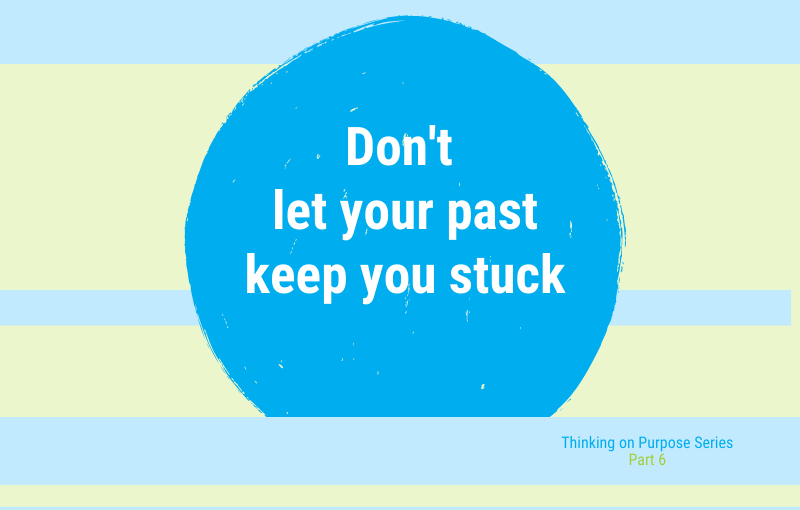Our thoughts determine what our life looks like.
We are all confronted with circumstances outside of ourselves that we can’t control:
The weather, our past, others and their behaviour, tax regulations, a pandemic, the price of a litre of milk, the time it gets dark in the evening, losing our job, the size of our feet, etc.
It’s easy to think that we don’t have power over how our lives look because of all the circumstances that we can’t influence.
We tend to forget, again and again, that we own the most powerful tool in the world – our mind.
What we think about the circumstances in our life and about ourselves is totally within our control, we are free to choose how we want to think about us and our life.
This is so important because what we are thinking determines how we are feeling, our feelings then fuel our actions which finally create the results in our life.
Our thoughts determine how we experience our life!
But how do we choose our thoughts? And where do they come from?
We have about 60,000 thoughts each day, most of them we are not aware of, they run in the back of our mind, unconsciously and automatically.
The vast majority of our thoughts are past-focused.
Many of our thoughts are ‘recycled’ thoughts from the past – they entered our mind a long time ago and we are re-using them again and again, on default, unintentionally.
This is especially true for the thoughts we have about ourselves.
“Who are you? What are you capable of?”
To answer these questions, most of us turn backwards, we go to our past.
We define ourselves and our capabilities by looking at who we have been, what we have done and what we have accomplished (or not) in the past.
We define and build our self-identity based on the past.
Many of the past-based definitions of ourselves are serving us.
-
- I always was an A+ student, I am really good at learning new stuff.
- I always find the right time to change my job to make the next step forward in my career.
- I am great at ocean swimming. Always have been.
- I never give up and that’s why I can overcome any challenge.
- I had a tough childhood, yes, and that made me a strong person.
- …
But most of us also have lots of past-focused thoughts that limit our potential and keep us stuck.
-
- I’ve always been overweight, it’s just who I am.
- I’ve never been very fit and active.
- I was shy as a child already, that’s why I don’t like social events.
- My father forced me to play the piano, that’s why I hate it now.
- I tried this three times without any success, it’s just not the right thing for me.
- I’ve always been a messy person.
- …
Why and how to switch our focus from the past to the future
The past is outside of our control. And it’s over.
Past failures, missed opportunities, challenging or hurtful experiences, negative circumstances – all gone.
So, as the past is gone anyway, it doesn’t make sense to continue to give it the power to negatively influence our present and future.
It’s our choice, we can decide to no longer let the past determine our thoughts, feelings and actions today. And in the future.
As soon as we have made this decision, we can start to take action:
-
- Becoming aware of our past-focused thoughts is the first step. We do thought downloads to get the stuff that we carried along from the past out of our mind by putting it on paper
- The next step is to do some mind-decluttering work. We separate the positive supportive thoughts from the self-limiting thinking and decide to let go of the latter.
- The final step is to reorganise our mind with intention. We search for powerful future-focused thoughts and practice thinking them so that they can help us move on with our life.
Why we need determination and commitment to focus on the future
Focusing our thoughts, feelings and actions on the future allows us to evolve.
As soon as we switch our attention from who we have been in the past to who we want to become in the future, we automatically start to do the things that help us create the life we want to live on purpose.
However, our mind doesn’t like to focus on the future.
Our mind doesn’t want us to evolve. It’s main goal is to make sure that we are safe. It doesn’t want us to change and move into unknown – and potentially ‘dangerous’ – territory. Thus, it is very attached to the well-known past and it wants us to stay where we are, in safe territory.
It’s good to know that our mind will always resist if we decide to focus on the future.
Knowing this helps us understand why it requires more energy and effort—and therefore more determination and commitment—to think about and plan for the future than to remember and rely on the past.
EXERCISE
This little exercise helps you uncover some of your past-focused thoughts and exchange them for new future-focused thoughts.
Step 1 – Become aware of the ‘always’ and ‘never’ in your life
Words like ‘never’ and ‘always’ indicate past-related thinking, feeling, and behaviour.
Give yourself 5 or 10 minutes to write down a few sentences about yourself that include the words ‘never’ or ‘always’.
Then pick two or three of those that don’t serve you.
Examples:
-
- ‘I always feel responsible for other people’s feelings.’
- ‘I never manage to finish a task on time.’
- ‘I’ve always been a messy person.’
Step 2 – Rephrase your sentences using the past tense.
Examples:
-
- ‘In the past, I used to feel responsible for other people’s feelings.’
- ‘I usually didn’t finish my tasks on time in the past.’
- ‘In the past, I had a tendency to mess up my place.’
Step 3 – Rephrase again, now taking a future-focused approach.
Examples:
-
- ‘Nowadays, I know that everyone is responsible for their own feelings. That’s why I can now focus on myself and my feelings.’
- ‘I’ve decided just now that I am getting better and better at finishing tasks on time.’
- ‘I am going to become really good at decluttering and keeping my place clean in the future.’
Play around and rephrase as often as necessary, until you find a sentence/thought that expresses your future-focus and makes you feel good.
Step 4 – Practice the new thought every day.
Use your new future-focused sentence to redirect your focus whenever your mind comes up with its stories of the past. And it will, because that’s its job.
-
- Set aside 5-10 minutes each day to review and meditate on your future-focused statements.
- Consider integrating these new beliefs into a daily affirmation practice.
- For instance, repeat your future-focused statements aloud each morning to reinforce the new mindset.
Step 5 – Stay committed. Have patience and compassion.
-
- Remind yourself, again and again, that it doesn’t matter what you thought, felt, or did in the past – it’s gone and out of your control.
It only matters what you decide to think, feel, and do now – and in the future. And that’s 100% in your control.
-
- Keep a journal to track your progress and reflect on any changes you notice in your thoughts and behaviours.
- Whenever you catch yourself slipping into old, past-focused thoughts, gently remind yourself of your future-focused beliefs and reaffirm your commitment to them.
HOW CAN I HELP YOU?
Are you tired?
Tired of trying to (re)organise the various areas of your life entirely on your own?
Fortunately, you don’t have to figure it out all by yourself.
We can do it together.
You can decide to get my support, advice, and guidance – and achieve the desired changes in your life so much faster and easier.

